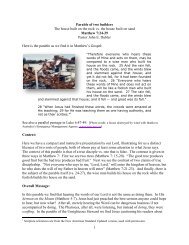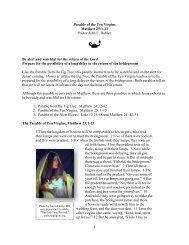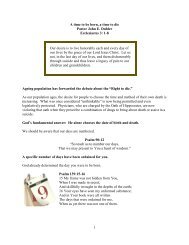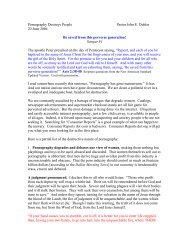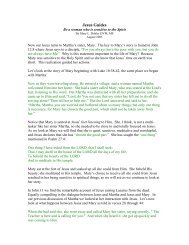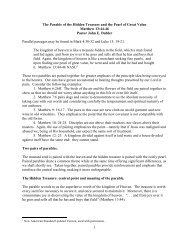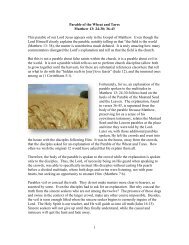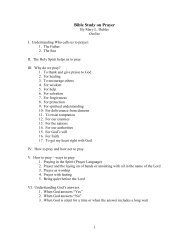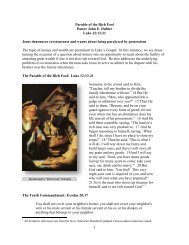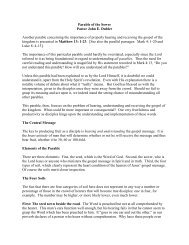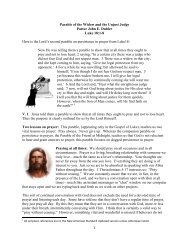1 Parable of the Dragnet Matthew 13:47-52 Pastor John E. Dubler ...
1 Parable of the Dragnet Matthew 13:47-52 Pastor John E. Dubler ...
1 Parable of the Dragnet Matthew 13:47-52 Pastor John E. Dubler ...
You also want an ePaper? Increase the reach of your titles
YUMPU automatically turns print PDFs into web optimized ePapers that Google loves.
<strong>Parable</strong> <strong>of</strong> <strong>the</strong> <strong>Dragnet</strong><br />
Mat<strong>the</strong>w <strong>13</strong>:<strong>47</strong>-<strong>52</strong><br />
<strong>Pastor</strong> <strong>John</strong> E. <strong>Dubler</strong><br />
The <strong>Parable</strong> <strong>of</strong> <strong>the</strong> <strong>Dragnet</strong>, unique to <strong>the</strong> Gospel <strong>of</strong> Mat<strong>the</strong>w, reveals that a day <strong>of</strong> judgment is<br />
coming when God will separate <strong>the</strong> good from <strong>the</strong> evil. The evil will be judged, found guilty and<br />
after separation from <strong>the</strong> good, thrown into <strong>the</strong> fiery furnace.<br />
For <strong>the</strong> sake <strong>of</strong> complete clarity, allow me to declare that <strong>the</strong> basis for <strong>the</strong> judgment will not be<br />
works for righteousness. Although this particular point is not referred to in <strong>the</strong> <strong>Parable</strong> <strong>of</strong> <strong>the</strong><br />
<strong>Dragnet</strong>, <strong>the</strong> importance <strong>of</strong> this critical doctrine <strong>of</strong> salvation through <strong>the</strong> Blood <strong>of</strong> <strong>the</strong> Lamb<br />
cannot be omitted.<br />
The only basis for separating <strong>the</strong> good from <strong>the</strong> bad<br />
will be <strong>the</strong> blood covering <strong>of</strong> our Lord Jesus Christ.<br />
“For by grace you have been saved through faith; and<br />
that not <strong>of</strong> yourselves, it is <strong>the</strong> gift <strong>of</strong> God; not as a<br />
result <strong>of</strong> works, so that no one may boast” (Ephesians<br />
2:8-9). 1 Ano<strong>the</strong>r passage phrases <strong>the</strong> same idea in<br />
<strong>the</strong>se words: “He saved us, not on <strong>the</strong> basis <strong>of</strong> deeds<br />
which we have done in righteousness, but according to<br />
His mercy, by <strong>the</strong> washing <strong>of</strong> regeneration and<br />
renewing by <strong>the</strong> Holy Spirit, whom He poured out<br />
upon us richly through Jesus Christ our Savior, so that<br />
being justified by His grace we would be made heirs according to <strong>the</strong> hope <strong>of</strong> eternal life” (Titus<br />
3:5-8). [Painting: Ecce Homo by Antonio Ciseri.]<br />
Thus, when <strong>the</strong> judgment books are opened, only one factor will determine our eternal destiny:<br />
If one‟s name is recorded in <strong>the</strong> Lamb‟s Book <strong>of</strong> Life (Jesus Christ being <strong>the</strong> Lamb <strong>of</strong> God), that<br />
person will not be judged. If he were to be judged for his sins he would be condemned along<br />
with <strong>the</strong> rest <strong>of</strong> <strong>the</strong> world who have not accepted <strong>the</strong> lordship <strong>of</strong> Jesus. But he whose name is<br />
recorded in that book will not be judged, but declared clean without judgment because <strong>of</strong> <strong>the</strong><br />
Blood <strong>of</strong> Jesus. (See Revelation 20:15 and Revelation 21:27).<br />
Here <strong>the</strong>n is <strong>the</strong> <strong>Parable</strong> <strong>of</strong> <strong>the</strong> <strong>Dragnet</strong> from Mat<strong>the</strong>w <strong>13</strong>: 2<br />
Again, <strong>the</strong> kingdom <strong>of</strong> heaven is like a dragnet cast into <strong>the</strong> sea, and<br />
ga<strong>the</strong>ring fish <strong>of</strong> every kind; and when it was filled, <strong>the</strong>y drew it up on <strong>the</strong><br />
beach; and <strong>the</strong>y sat down and ga<strong>the</strong>red <strong>the</strong> good fish into containers, but <strong>the</strong><br />
bad <strong>the</strong>y threw away. So it will be at <strong>the</strong> end <strong>of</strong> <strong>the</strong> age; <strong>the</strong> angels will<br />
come forth and take out <strong>the</strong> wicked from among <strong>the</strong> righteous, and will<br />
throw <strong>the</strong>m into <strong>the</strong> furnace <strong>of</strong> fire; in that place <strong>the</strong>re will be weeping and<br />
gnashing <strong>of</strong> teeth.<br />
1 Scriptural references are to <strong>the</strong> New American Standard Updated Version, unless o<strong>the</strong>rwise noted.<br />
2 I have included in <strong>the</strong> discussion <strong>of</strong> this parable <strong>the</strong> subsequent comparison <strong>of</strong> a scribe who has become a disciple<br />
<strong>of</strong> <strong>the</strong> kingdom <strong>of</strong> heaven, not treating it as a separate parable as some do.<br />
1
“Have you understood all <strong>the</strong>se things?” They said to Him, “Yes.” And<br />
Jesus said to <strong>the</strong>m, “Therefore every scribe who has become a disciple <strong>of</strong><br />
<strong>the</strong> kingdom <strong>of</strong> heaven is like a head <strong>of</strong> a household, who brings out <strong>of</strong> his<br />
treasure things new and old” Mat<strong>the</strong>w <strong>13</strong>: <strong>47</strong>-<strong>52</strong>.<br />
Meaning: The <strong>Parable</strong> <strong>of</strong> <strong>the</strong> <strong>Dragnet</strong> is about <strong>the</strong> end-time judgment <strong>of</strong> all souls. This includes<br />
all people living at <strong>the</strong> time <strong>of</strong> <strong>the</strong> Lord‟s return, and all <strong>the</strong> dead who have ever lived upon <strong>the</strong><br />
earth from <strong>the</strong> beginning <strong>of</strong> time. The sea gives up <strong>the</strong> dead in it and death and Hades give up<br />
<strong>the</strong> dead in <strong>the</strong>m. Those who are alive and remain at <strong>the</strong> coming <strong>of</strong> our Lord Jesus will appear at<br />
this judgment (Revelation 20: 12-15). In o<strong>the</strong>r words: Everyone who has ever lived or will live<br />
appears before this judgment which is commonly referred to as <strong>the</strong> “Great White Throne<br />
Judgment” (Revelation 20:11). 3<br />
Good and bad fish: Not all who walk <strong>the</strong> earth have faith, obviously. This comes as no great<br />
surprise to anyone to think that <strong>the</strong>re may be no small number <strong>of</strong> “bad fish” in <strong>the</strong> net who do not<br />
know <strong>the</strong> Lord. [Photo: Contemporary net fisherman on <strong>the</strong> Sea <strong>of</strong> Galilee. Courtesy Holy Land Photos.]<br />
But a more disturbing issue is that not all who<br />
are in <strong>the</strong> visible church are truly Children <strong>of</strong><br />
God—good fish. Becoming a member <strong>of</strong> a<br />
church or a Christian organization, no matter<br />
how noble or fine it may be, is not <strong>the</strong> same as<br />
belonging to Jesus. Thus, it is very possible that<br />
many people who think that <strong>the</strong>y are Christians<br />
are not really believers at all. To become a<br />
believer one must confess that his own efforts to<br />
save himself have failed—his self-righteousness,<br />
his good deeds, even his ancestry or his<br />
memberships in fine organizations. He acknowledges that he is in fact a sinner. He has broken<br />
God‟s holy law and deserves to die. But, by God‟s grace, through faith, he calls out to <strong>the</strong> Lord<br />
Jesus Christ to save him. He asks Jesus to forgive his sins and cleanse him <strong>of</strong> all<br />
unrighteousness, expressing at <strong>the</strong> same time a total willingness to make Jesus LORD <strong>of</strong> his life.<br />
I have added <strong>the</strong> emphasis in all capital letters as <strong>the</strong> issue <strong>of</strong> lordship weighs very heavily upon<br />
those <strong>of</strong> us who preach <strong>the</strong> gospel. Just acknowledging that Jesus is <strong>the</strong> Son <strong>of</strong> God is no more<br />
than demons do. The demons know who Jesus is and tremble. But when one makes Jesus Lord<br />
<strong>of</strong> his life, <strong>the</strong>n <strong>the</strong> transformation can begin. And, when such a cry comes from <strong>the</strong> heart, no<br />
force or power can separate that man from <strong>the</strong> love <strong>of</strong> God and His merciful redemption. Jesus<br />
will save and preserve that person forever.<br />
Therefore, we see through this parable that <strong>the</strong>re will be a separation <strong>of</strong> <strong>the</strong> sheep from <strong>the</strong> goats<br />
at <strong>the</strong> end <strong>of</strong> <strong>the</strong> age. Whe<strong>the</strong>r this judgment is referred to as separating <strong>the</strong> sheep from <strong>the</strong> goats<br />
3 Those who died before <strong>the</strong>y could conscientiously know right from wrong (<strong>the</strong> so-called age <strong>of</strong> accountability) will<br />
not, in my view, be condemned. See 2 Samuel 12: 19-23.<br />
2
or <strong>the</strong> wicked from <strong>the</strong> righteous or <strong>the</strong> wolves from <strong>the</strong> sheep, or <strong>the</strong> good fish from <strong>the</strong> bad;<br />
<strong>the</strong> message is one and <strong>the</strong> same.<br />
In order that all may know from <strong>the</strong> Word <strong>of</strong> God that <strong>the</strong>re are wolves among <strong>the</strong> sheep, I<br />
submit three passages from Mat<strong>the</strong>w‟s gospel:<br />
Mat<strong>the</strong>w 7:15-20 “Beware <strong>of</strong> <strong>the</strong> false prophets, who come to you in sheep's clothing, but<br />
inwardly are ravenous wolves. You will know <strong>the</strong>m by <strong>the</strong>ir fruits. Grapes are not ga<strong>the</strong>red<br />
from thorn bushes nor figs from thistles, are <strong>the</strong>y? So every good tree bears good fruit, but <strong>the</strong><br />
bad tree bears bad fruit. A good tree cannot produce bad fruit, nor can a bad tree produce good<br />
fruit. Every tree that does not bear good fruit is cut down and thrown into <strong>the</strong> fire. So <strong>the</strong>n,<br />
you will know <strong>the</strong>m by <strong>the</strong>ir fruits.”<br />
Mat<strong>the</strong>w 24:11-12 Many false prophets will arise and will mislead many. Because<br />
lawlessness is increased, most people's love will grow cold.<br />
Mat<strong>the</strong>w 24:24-26 For false Christs and false prophets will arise and will show great signs<br />
and wonders, so as to mislead, if possible, even <strong>the</strong> elect. Behold, I have told you in advance.<br />
So if <strong>the</strong>y say to you, “Behold, He is in <strong>the</strong> wilderness,” do not go out, or, “Behold, He is in<br />
<strong>the</strong> inner rooms,” do not believe <strong>the</strong>m.<br />
In this last passage we find “false prophets” and “false Christs.” There is no more clear evidence<br />
<strong>of</strong> <strong>the</strong> infiltration <strong>of</strong> <strong>the</strong> sheep by wolves than this statement. The Scriptures give us seven<br />
“false” categories <strong>of</strong> people. The word ψέύδι “pseudi” is used in <strong>the</strong> Greek. We have adopted<br />
<strong>the</strong> word in English, using it to describe something that looks like or resembles <strong>the</strong> true copy,<br />
such as a “pseudonym” or “pseudoscience.” The word is not negative in all cases in <strong>the</strong> English.<br />
However in <strong>the</strong> Greek it literally means “lying.” A “pseudo prophet” <strong>the</strong>refore is not one who is<br />
trying to be a prophet and not making <strong>the</strong> grade, but a false, lying prophet, attempting to<br />
devastate <strong>the</strong> flock (whe<strong>the</strong>r he knows it or not.)<br />
Seven “pseudo” <strong>of</strong> scripture (with thanks to Rick Renner): 4<br />
1. Pseudoapostolos: false apostles (2 Corinthians 11:<strong>13</strong>)<br />
2. Pseudoprophetes: false prophets (Mat<strong>the</strong>w 7:15)<br />
3. Pseudodidaskolos: false teachers (2 Peter 2:1)<br />
4. Pseudochristos: false Christs (Mat<strong>the</strong>w 24:24)<br />
5. Pseudoadelphos: false bro<strong>the</strong>rs (2 Corinthians 11:26)<br />
6. Pseudomartureo: false witness (Mat<strong>the</strong>w 19:18)<br />
7. Pseudologos: false word or one who speaks falsehood (1 Tim 4:2)<br />
We are not at all subject to <strong>the</strong> devices <strong>of</strong> those false apostles, teachers, prophets and even false<br />
Christs. We can know <strong>the</strong> pseudo from <strong>the</strong> true by examining <strong>the</strong> fruit. This refers to a person‟s<br />
deeds, actions, moral character, behavior, and even his work. What comes forth from <strong>the</strong> man<br />
indicates what‟s inside <strong>the</strong> man. Therefore we are wise not to be too impressed with <strong>the</strong> tree<br />
itself. Look for <strong>the</strong> fruit.<br />
4 R. RENNER, Sparkling Gems from <strong>the</strong> Greek, (Tulsa, 2003), p. 649.<br />
3
Some differences: The message <strong>of</strong> separation and judgment in <strong>the</strong> <strong>Parable</strong> <strong>of</strong> <strong>the</strong> <strong>Dragnet</strong> is<br />
similar to that found in <strong>the</strong> <strong>Parable</strong> <strong>of</strong> <strong>the</strong> Wheat and Tares but with this important difference:<br />
The Wheat and Tares shows us that <strong>the</strong> righteous and <strong>the</strong> wicked will grow toge<strong>the</strong>r, coexisting<br />
until <strong>the</strong> end <strong>of</strong> <strong>the</strong> age and <strong>the</strong>n separation <strong>of</strong> <strong>the</strong> wicked from <strong>the</strong> righteous occurs. The<br />
<strong>Dragnet</strong>, by contrast, does not focus on <strong>the</strong> entire process from now until judgment but on <strong>the</strong><br />
day <strong>of</strong> separation and judgment itself—<strong>the</strong> end <strong>of</strong> <strong>the</strong> age. So, while <strong>the</strong> kingdom contains both<br />
good and bad fish, only <strong>the</strong> final sweep <strong>of</strong> <strong>the</strong> dragnet and subsequent dragging <strong>of</strong> <strong>the</strong> net up on<br />
<strong>the</strong> beach reveals which fish are good and which are not. The <strong>Dragnet</strong> <strong>the</strong>refore is more tightly<br />
focused, revealing to us <strong>the</strong> principle <strong>of</strong> separation and judgment in a more stark light.<br />
Separation <strong>of</strong> <strong>the</strong> wicked from <strong>the</strong> righteous. The process <strong>of</strong> separation is very similar to <strong>the</strong><br />
<strong>Parable</strong> <strong>of</strong> <strong>the</strong> Wheat and Tares where we saw <strong>the</strong> tares ga<strong>the</strong>red up at harvest time, bound into<br />
bundles and burned. Similarly, in <strong>the</strong> <strong>Parable</strong> <strong>of</strong> <strong>the</strong> <strong>Dragnet</strong>, <strong>the</strong> bad fish are thrown away.<br />
(The bad fish are said to be “thrown away” in <strong>the</strong> parable because inedible fish are not normally<br />
burned in a furnace.) In <strong>the</strong> explanation <strong>of</strong> <strong>the</strong> parable we are told that <strong>the</strong> wicked are separated<br />
from <strong>the</strong> righteous and not “thrown away,” but burned up in <strong>the</strong> fiery furnace.<br />
Elements <strong>of</strong> <strong>the</strong> parable:<br />
The first element <strong>of</strong> interest is <strong>the</strong> dragnet itself. The Greek word used here is ή ή<br />
[sagene, its only occurrence in <strong>the</strong> New Testament being here in Mat<strong>the</strong>w]. Sagene is a seine<br />
net, that is to say, a large net with weights on <strong>the</strong> bottom and floats on<br />
top, hanging vertically in <strong>the</strong> water, enclosing all fish larger than its grid.<br />
After a pre-determined time its ends are drawn toge<strong>the</strong>r and <strong>the</strong> net<br />
pulled up on <strong>the</strong> beach. Two boats would be used to set out <strong>the</strong> large<br />
net. The net represents <strong>the</strong> preaching <strong>of</strong> <strong>the</strong> word. It is <strong>the</strong> Gospel<br />
message going out in all parts <strong>of</strong> <strong>the</strong> world. Some are swept up in <strong>the</strong><br />
excitement <strong>of</strong> a revival or preaching meeting but do not truly desire to<br />
become disciples. O<strong>the</strong>rs are simply “along for <strong>the</strong> ride,” whe<strong>the</strong>r<br />
convinced to come by family or friends or for some o<strong>the</strong>r reason find<br />
<strong>the</strong>mselves exposed to <strong>the</strong> gospel message. Not all “fish” who are thus<br />
responding to <strong>the</strong> gospel message will indeed become true disciples.<br />
I am reminded <strong>of</strong> a skiing trip we were on two years ago. We were accompanied by a friend<br />
who was just learning to ski. She decided to take a lesson from <strong>the</strong> ski resort‟s pr<strong>of</strong>essional ski<br />
instructor staff. The first question he asked to his assembled class was, “Why are you here? Did<br />
you come to learn to ski? How many are here skiing for love?” By “love” he meant, “how many<br />
<strong>of</strong> you are here simply because you love someone who skis, and <strong>the</strong>y want you to be a pr<strong>of</strong>icient<br />
skier so you can be toge<strong>the</strong>r and share <strong>the</strong> experience.” That‟s “skiing for love.” But a stark fact<br />
will always pursue and eventually overtake a person who is so motivated: If at some point that<br />
person does not fall in love with skiing itself, <strong>the</strong>y will sooner or later abandon <strong>the</strong> cause.<br />
Just so with Christianity and <strong>the</strong> kingdom. A person may hear <strong>the</strong> preaching <strong>of</strong> <strong>the</strong> gospel<br />
because <strong>of</strong> <strong>the</strong> love <strong>of</strong> a friend, or his love for a friend. But sooner or later, if he does not want to<br />
hear <strong>the</strong> preaching <strong>of</strong> God‟s Word because he has fallen in love with <strong>the</strong> Savior, Jesus; he will<br />
not be back.<br />
4
Finally, <strong>the</strong>re is a set time when <strong>the</strong> preaching <strong>of</strong> <strong>the</strong> word will be finished and come to an end.<br />
“And this gospel <strong>of</strong> <strong>the</strong> kingdom shall be preached in <strong>the</strong> whole world for a witness to all <strong>the</strong><br />
nations, and <strong>the</strong>n <strong>the</strong> end shall come” (Mat<strong>the</strong>w 24: 14). Whenever that time comes to pass, <strong>the</strong><br />
net is dragged up—meaning <strong>the</strong> end times come.<br />
The sea: The world or anywhere <strong>the</strong> Gospel is preached. Before <strong>the</strong> end, no place will have a<br />
chance to say, “We never, ever, heard <strong>the</strong> message.”<br />
The fish in <strong>the</strong> net: Everyone in <strong>the</strong> world, including all those who find <strong>the</strong>mselves in <strong>the</strong><br />
visible kingdom, <strong>the</strong> church, whe<strong>the</strong>r sincere or insincere. The good fish are those who are true<br />
disciples. The bad fish are <strong>the</strong> wicked, those who never knew, never wanted to know, thought<br />
<strong>the</strong>y knew but didn‟t, or pretended to know. Included here are <strong>the</strong> insincere and false disciples,<br />
including false teachers, and false apostles.<br />
The sorting <strong>of</strong> <strong>the</strong> fish: This is <strong>the</strong> final judgment at <strong>the</strong> end <strong>of</strong> <strong>the</strong><br />
age. This judgment, which really does sweep all fish into <strong>the</strong> net, is<br />
referred as “The White Throne Judgment” based on Revelation 20:<br />
11-15: “Then I saw a great white throne and Him who sat upon it,<br />
from whose presence earth and heaven fled away . . .” Believers,<br />
though standing <strong>the</strong>re before <strong>the</strong> judgment seat, are not judged and<br />
condemned. The judgment that those believers deserved has been<br />
paid in full on <strong>the</strong> cross by <strong>the</strong> Lord Jesus. Therefore, when <strong>the</strong>ir<br />
name is called for judgment, <strong>the</strong> recording angel opens <strong>the</strong> book <strong>of</strong><br />
Life and if that person‟s name is found written <strong>the</strong>rein, he is exempt<br />
from judgment and eternal death and hell fire. This is what is<br />
meant by <strong>the</strong> blood covering <strong>of</strong> <strong>the</strong> Lamb. Our sins are covered<br />
over by <strong>the</strong> blood. It is as if we never sinned. Our just penalty is<br />
paid for by ano<strong>the</strong>r, namely Jesus, who, though innocent, suffered and died on <strong>the</strong> cross <strong>of</strong><br />
Calvary, paying for our sins in full. There is nothing we can do to atone for ourselves; we need a<br />
savior. Jesus is <strong>the</strong> only one who qualifies. [Photo: Sorting fish courtesy NOAA fisheries,<br />
magazine.noaa.gov.]<br />
Have you understood all <strong>the</strong>se things? The disciples answered, “Yes.” Certainly this was an<br />
astounding answer. Would <strong>the</strong>y had replied, “no,” or “not really, we could use some additional<br />
teaching.” But I can fully empathize. Many times I have had teachers ask me, “Do you<br />
understand?” I have answered in <strong>the</strong> affirmative, not because I was proud and afraid to admit<br />
that I did not know. I said, „yes‟ because I was so very lost I had no idea where to begin. In<br />
Jesus‟ question and <strong>the</strong> disciples‟ remarkable “Yes” answer, Mat<strong>the</strong>w is not portraying <strong>the</strong><br />
disciples as understanding everything, but ra<strong>the</strong>r as Carson so aptly puts it, but that <strong>the</strong>y<br />
understood nothing. 5<br />
The disciples certainly understood more than <strong>the</strong> crowds, but <strong>the</strong>ir understanding was still<br />
woefully inadequate. Jesus would later rebuke <strong>the</strong>m for <strong>the</strong>ir dullness <strong>of</strong> understanding<br />
(Mat<strong>the</strong>w 15:16 regarding clean foods). Nor do we claim, even today, to have a perfect<br />
5 D. A. CARSON, The Expositor‟s Bible Commentary, (Zondervan, Grand Rapids, 1984), p. 331.<br />
5
understanding <strong>of</strong> <strong>the</strong> parables. Some things will have to wait until we are face to face with Jesus<br />
in glory.<br />
New and Old: The parable concludes with <strong>the</strong>se words, “Therefore every scribe who has<br />
become a disciple <strong>of</strong> <strong>the</strong> kingdom <strong>of</strong> heaven is like a head <strong>of</strong> a household, who brings out <strong>of</strong> his<br />
treasure things new and old” (Mat<strong>the</strong>w <strong>13</strong>: <strong>52</strong>).<br />
Not all <strong>the</strong> scribes and Pharisees sc<strong>of</strong>fed at him as did <strong>the</strong> Pharisees in <strong>the</strong> <strong>Parable</strong> <strong>of</strong> <strong>the</strong><br />
Unrighteous Steward (Luke 16: 14), or grumble as did <strong>the</strong> Pharisees and scribes in <strong>the</strong> <strong>Parable</strong> <strong>of</strong><br />
<strong>the</strong> Lost Sheep (Luke 15:2). Some scribes were <strong>of</strong> a humble and contrite heart and were very<br />
ready to hear <strong>the</strong> Good News preached to <strong>the</strong>m. As scribes, <strong>the</strong>y would be highly educated, very<br />
conversant with <strong>the</strong> scriptures, and acting as teachers <strong>of</strong> <strong>the</strong> law. Therefore, if such a person<br />
became a believer and a disciple <strong>of</strong> our Lord, <strong>the</strong>y had a double treasure to draw upon, namely<br />
<strong>the</strong> old covenant prophecies and <strong>the</strong>ir firsthand accounting <strong>of</strong> learning and seeing how Jesus<br />
fulfilled <strong>the</strong>m. Thus, <strong>the</strong> scribe who becomes a disciple can bring out <strong>of</strong> his storehouse (<strong>the</strong><br />
treasury <strong>of</strong> <strong>the</strong> Word <strong>of</strong> God) things new and old.<br />
6



